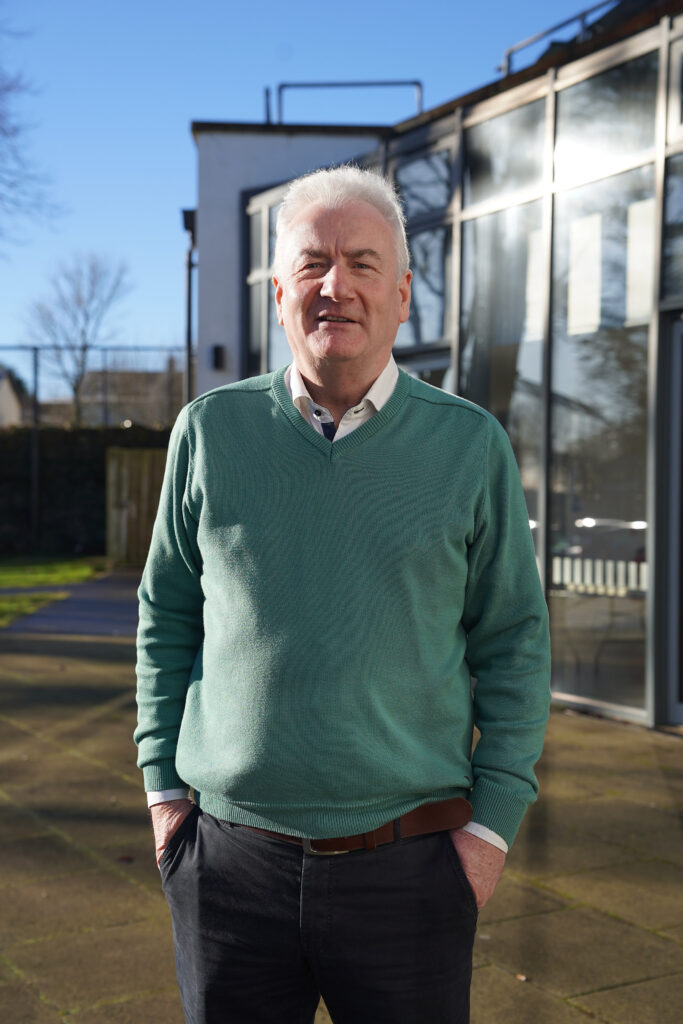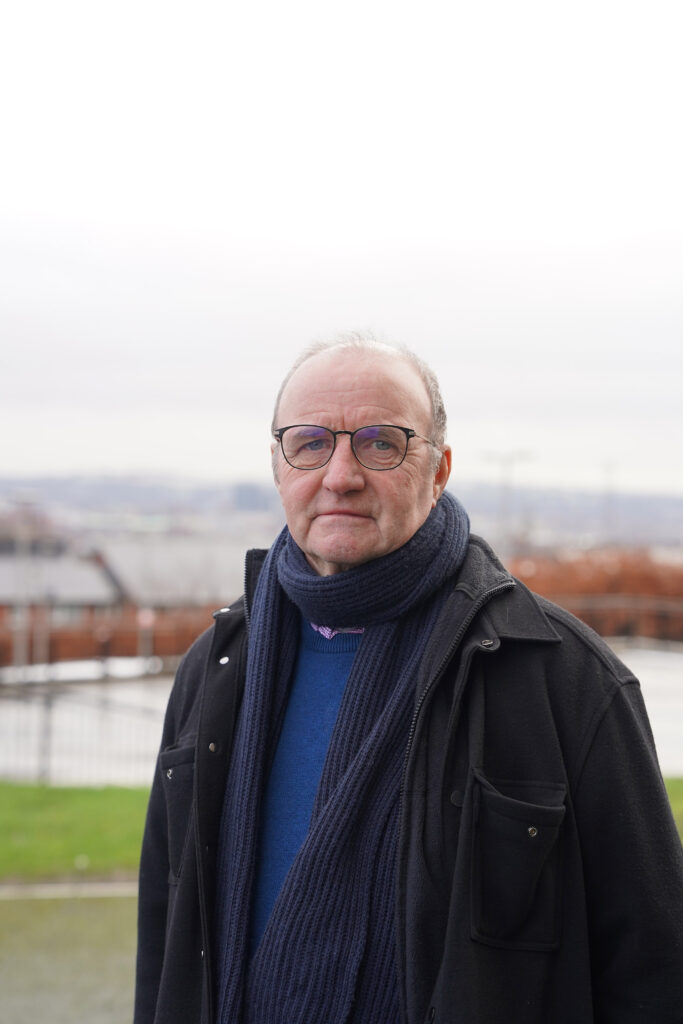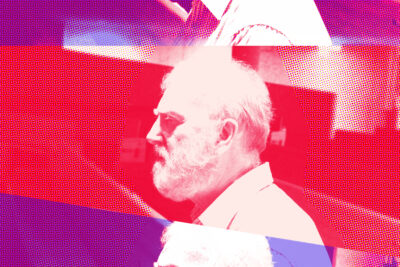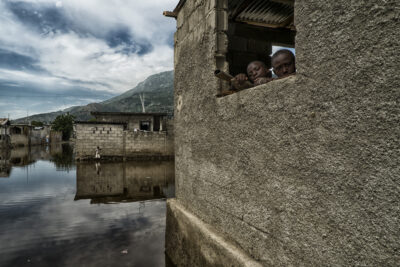This article appears in Passio Magazine Issue 13 — buy a limited-edition print copy here.
North Belfast is a community that has seen immense trauma over the past century — defined by huge political forces beyond its control.
Within that world, the Passionists of North Belfast represent an incredible legacy of solidarity and integrity. For decades, they’ve worked tirelessly both to improve the lives of their parishioners and to be present with them in their challenges.
But the political and cultural landscape has changed irrevocably in the past 20 years. Can a wartime Parish be refitted for a new age?
The Crumlin Road runs from the centre of Belfast, climbing uphill towards Holy Cross Church in Ardoyne, and beyond. Although innocuous to the tourist, it represents a political fault-line, where ‘nationalist’ and ‘unionist’ areas meet. More obvious to the outsider’s eye are the ‘peace lines’ on several surrounding streets: dividing walls, in fact, up to 45-feet tall to discourage violence between communities.
These inner borders do not represent what they used to. Belfast is continually changing: the city is more diverse and less religious than it’s ever been, especially to look at its centre, which has a somewhat homogenised ‘global’ feel. A fifth of the population are “neither” voters, who claim disinterest in unionist and nationalist aspirations altogether.
Travel the Crumlin Road, however, and you quickly find a Belfast that is still a complex, haunted place. About 60 of those peace walls are still standing, 25 years after the Good Friday Agreement: while there is no desire to return to Belfast’s darkest days, there is still a latent fear and distrust among communities in the acknowledged epicentre of the Troubles. And across the city, children are still divided between Protestant or Catholic schools; over eight in 10 people still vote along constitutional lines. All of this is a testament to the violent forces of political myth-making that have sought to shape Belfast this way or that—not just in the last Century, but for hundreds of years prior.

Standing in the current of those political forces, we find the community of Passionists in Ardoyne: picking up the pieces of past traumas, helping a hurt community, while themselves grappling with the surges of change and secularisation. Northern Ireland’s Chief Constable, I’m told, once said: If there’s anywhere in this country where the Passionists should be, it’s in Ardoyne, in the midst of this. “And that’s coming from a Protestant,” Brian McKee, who tells me this, laughs. “Not just a Protestant—a cop!”
Brian is the definition of a community stalwart: born and raised in Ardoyne, a well-known figure giving his all for the neighbourhood, with a worm’s-eye view of the changes. “Imagine you’re a tourist in Belfast, and you’re given a map of the city from 1950,” he explains. “We can’t use old maps when we’re in new territory. Sure, the main pillars are still there, but everything in-between has changed.”
For the past 14 years, Brian has been working with the Passionists in their Peace and Reconciliation projects. “Passionist spirituality is just who I am, it’s where I grew up. I think the very fact of the Passionists’ frailty and their faults appeals to me — we’re in a broken world, and we’re broken people; broken Passionists,” he says. “That’s reality.”
“Spirituality is there, but we haven’t been able to give people the language, or make the connections for them. I don’t know how we recover it, but I think we can.”
Brian Mckee
Brian explored the idea of joining the Passionists as a priest; he found his own path, but kept that identification with Passionist life, in the form of serving others. As a 20-year-old, he found himself working in a night shelter; later, working as a teacher; then a leader of youth ministry in the diocese. He laughs at the fact that young people in the neighbourhood have reflexively called him “Father Brian” for years, but I’m not surprised; there’s an affable frankness in him that’s easy to confide in.
“Young people can be so open to spiritual conversations,” he insists. “Yes, church is largely seen as irrelevant. Ask people about prayer and you get the stock answers. But you can get past that. The death of a grandparent, a parent who’s sick, family troubles, when they’re lost, confused; they’re the moments prayer did mean something to them. There’s something there, but we haven’t been able to give them the language, or make the connections for them.”

The Peace and Reconciliation team work with young men, mostly, from the Ardoyne and Shankill areas, who are involved in organised fights. “It’s a bit like Celtic and Rangers,” as Brian puts it. “It’s their tribe; it’s along sectarian lines, but religion doesn’t really come into it.” They work on creating spaces for dialogue and inclusivity; they also work hard to de-glamourize the pull of gang culture, even taking coach-loads of young people to Cape Town to talk to former gang members, family and police.
The Houben Centre, on the Holy Cross Church site, is the base for much of this community activity: sitting symbolically on the interface of the traditionally divided communities—so much so that there are two entrances to the building, on the ‘Catholic’ and ‘Protestant’ sides.
Community activist Alan Waite, who also meets us in the centre, recalls that as a child growing up in the Shankill area—a staunch Loyalist community at that time—he was convinced those around him that Catholics were the ‘spawn of Satan’. Meeting a Catholic in the flesh at the age of nine, Alan found himself staring, searching their head for the horns that he had genuinely been expecting to find.
Such were the mental barriers, let alone the physical ones, that were perpetuated amongst and between the two communities—barriers built, all too sadly, on prejudice that so easily manifested itself in discriminatory behaviour in Northern Irish society at large.
Today, Alan’s relationship with the local Catholic community couldn’t be more different. As Senior Manager of R-City Youth Project North/West Belfast, Alan views the Houben Centre as a shining light in one of the darkest places in the country; and since its foundation in 2013, R-City has become one of the most important and impressive youth projects in the country, aiming to build bridges between the divided communities.
Brian, in turn, is quick to disarm the ‘Catholic and Protestant’ labels, like most people I talk to—even though they slip into those terms sometimes. For the increasingly secular British public, I suspect that the spectre of religion contributes to a misunderstanding of Ireland’s conflict, and makes it feel opaque, alien. That’s a tragedy, because the history of the ‘Protestant Ascendancy’ deserves to be retaught, alongside the many other British colonial projects of the era—the Biafra War, the Nakba in Palestine, the Highland Clearances and so many more.
Even without that wider history, it’s clear where Ardoyne’s problems began to intensify. In Westminster’s Partition of Ireland, in 1921, Ardoyne was one of a few ‘stranded’ nationalist communities; rather than being part of the declared ‘Irish Republic’ in the South, where their sympathies lay, they found themselves bundled into the newly-created ‘Northern Ireland’. This community in Belfast, then, quickly saw immense discrimination: evictions, ghettoisation and unemployment in particular, at the hands of an NI government who would rather they’d just disappear.
The community here was defined for a very long time by that struggle and discrimination; later, by violence and grief. The Passionists, in turn, proved their worth to the community through radical solidarity: rebuilding burnt-out houses, constructing factories and making jobs, walking down riot-torn streets, accompanying children through waves of hatred on the way to school, or simply hours spent counselling and listening to stories of hurt and loss.
Staring into the heart of all these problems led to the founding of the Flax Trust, possibly the most remarkable of their projects—founded on a wing, a prayer, and an unlikely bank loan by Fr Myles Kavanagh back in 1977. The Flax Trust’s legacy to the area across fifty years is astonishingly holistic: social programmes, health programmes, business incubation, arts development and more.
All these came out of direct need; at the time, there was neither a doctor’s surgery nor a supermarket in Ardoyne, for example. Locals could travel to other areas, but that was an intimidating prospect in the height of the Troubles; besides which, plenty of people had no transport. Michael Stevenson, himself a cornerstone of the Trust, recalls Fr Myles assembling the community together to list their needs: “Myles says, ‘Tell me what difficulties you’re facing’,” Michael explains. “‘Don’t tell me how we can’t do anything, just tell me: what do we need, here?’”

A medical centre was built. A shopping centre was built. The derelict linen mill became a business centre. The list goes on: this was ground-level, slightly miraculous stuff, supporting the elderly, the unemployed, the long-term imprisoned, the embattled parishioners. This was a full-on assault against anything that would rob the community of dignity, enacted with the seemingly undauntable optimism that these things would work out; it was a work of love that, by the looks of it, had already cast out fear.
“Father Myles has that passion, the love of the community,” one parishioner told me with a smile. “He has that zest and encouragement.”
There can be a ‘golden age’ gleam even to this Passionist history, as there might be for any organisation that found its purpose in conflict and war, fortified through self-giving sacrifice and resilience. And truthfully, the achievements for the community ought to be remembered and celebrated.
But of course, the ground in North Belfast has shifted again. The Catholic, Christian identification may still be strong, but it’s not reflected in church attendance, or even adherence to long-presumed beliefs. The unbearable abuse scandals among the church at large accelerated what was already there, of course, and can’t be overstated: but the trend had begun even before that.
It’s difficult for those who have stayed committed; those who can remember days of full pews, the local community sharing the same rituals. When I ask our interviewees what the Passionists can do better for the community, almost everyone assumes that the real question I’m asking is “What could we do to get people back to Mass?”. Initially I take that as a comment on the perceived priorities of the priests, but it does occur to me that it might reflect their own sense of loss, too.
Indeed, none of the priests I speak to are hanging their hopes on a grand return to the church building. In fact, the projects in which they are investing their time speak to a twenty-first Century mindset, turning outwards to be bringers of peace and reconciliation to the community around them. It’s a posture that matches Pope Francis’s vision of a synodal church for this third millennium.
Brian is emphatic about this trend. “To make a new map, you have to walk the territory first. You have to get lost. And only when you reflect upon the ground that you walked on, can you then draw the map. That means: tell us about your life, about your struggles, where you find hope. Let them talk about it, and then you can put language on it. Start with experience.”
“Priests are unsung heroes. They burrow away in the community, providing help.”
Jim Gibney
Passionist priest Austin Smith wrote about the need to act as an ‘undertaker and a midwife’ in the constant change of life: to be able to respectfully let go of what has ended, and choose to take part in the birth of new things. Following Jesus, and following the active, life-giving Spirit in the world, is never a finished work; like the Son of God, we never have a place to lay our head before we’re disrupted again, barely have a quiet moment to pray before the problems proliferate in front of us.
Although we are more than a generation past the Good Friday Agreement, the intergenerational effect of trauma makes itself profoundly felt in Belfast. Ardoyne remains an area of social deprivation, with high levels of suicide, separation, domestic violence and depression. Many families have lost a parent or a child in the conflict, or suffered from having a father figure in prison. It’s easy to rattle off statistics, but for each individual, these things are world-shattering events.
“It’s a deeply hurt community,” Jim Gibney tells me. “The loss of life has been profound, and the trauma that comes with it.” A member of Sinn Fein, Jim has lived through the extremes: a zealous teenager amid political conflicts and violence; several spells in prison; and a party-political role in the peace process.
It was after all this that the psychological problems began, as he tells me. Although Jim has been through a rehabilitation process that granted him anonymity, he chose to make his story public due to his subsequent struggles with PTSD, in a bid to help others seek help.
Jim’s struggles brought him to the doors of Daneo — or to use its full name, Daneo Human and Spiritual Development Services, spearheaded by Passionists’ John Friel and Pat Duffy.
“Daneo was a wonderful experience for me personally,” Jim says warmly. “The same for the others that I have sent their way since. The service they provide is a very important lifeline for lots of people, who have been broken by the circumstances of the conflict. People have been psychologically and personally rebuilt, in a way.”

Daneo, now a key part of the Passionist ministry in Belfast, is an integrated approach to faith and psychotherapy that has grown and developed over 30 years; a way of drawing on the best psychological research without omitting people’s spiritual questions and desires. Alan Lorimer—a Methodist Minister who works in the Daneo team—explains that in the early 90s, “my friends in psychology were generally incredulous to my religious views, while many of my religious friends were sceptical of psychology.”
Finding the harmony between these two worlds was clearly an important personal process for the practitioners themselves; but their clients benefitted too, finding an environment where they could talk about themselves as fully emotional and spiritual people. It’s funny, of course, that in 2024, counselling has shed a lot of its stigma, and spirituality has outlasted the ‘new atheism’ on the rise in the 90s; so talking to your therapist about spirituality may seem normal to younger generations, but Daneo has been there, paving the road.
“People want to believe in something beyond themselves; they need to,” nods Jim. “There are difficulties for the church, but I think faith is stronger than that implies. That need has been around for a long long time. It’s the milieu in which we live and experience things.
“I just know that priests and nuns are needed, as they’ve always been needed,” he adds. “When you get away from those big ‘conflict’ moments and just come down to the community, you find priests helping people out in their everyday lives. They’re unsung heroes; they burrow away there in the community, providing help and assistance. People still look to them for spiritual and emotional guidance.”
Returning to Belfast in 1983 after a decade in the US, Chris McMullan recalls being amazed at the material improvements in living (“people had cars, telephones—carpets! When I’d left, people hadn’t had these things; they had oilcloths on the floor.”). At the same time, she returned to find three of her brothers in prison; her mother had suffered a heart attack. She now works as a bereavement counsellor with other families in the community, as a representative of Holy Cross.
“The comfort you give people, the help, is so much appreciated,” she says. “And there is good that can come out of grief; there has to be. It might bring someone back to their faith. Finding my faith again was the best thing I could ever do.”
“Passionists become part of our community, and allow us to be part of theirs.”
Wilma Lynch
Being present in the worst moments of somebody’s life: this is a profound connection that can’t be easily quantified, and it can’t be manufactured, without the simple work of living in the community, day by day. “Passionists have an understanding of people, and what people experience in their daily lives,” as Jim Gibney puts it.
It’s an understanding that’s borne out through being there, when it’s unglamorous, monotonous, even thankless, until the pieces fall into place.
In fact, several of our interviewees allude to their lowest moment, the presence of Passionists there, and the feeling of lasting relationship that has lingered since. These are, as Fr John Friel puts it, “serendipity moments”.
“I think Passionists take that word ‘community’ very seriously,” Wilma Lynch tells me; she tearfully recalls Fr Gary Donegan appearing fortuitously on the “worst day of her life.” Crucially, Fr Gary allowed himself to be interrupted and to be with Wilma when he was needed.
“Passionists become part of our community, and graciously allow us to become part of theirs. I think they’re experts at finding specialness in the ordinary. The passion to preserve life and improve life, that’s to me what Passionists are.”
Political history still echoes loudly in this relatively small community. It’s unlikely there’s anyone here whose life has not been affected by violence, and grief as a result of it. But there is hope. Not just in the wider picture, where the political profile of Ireland is changing; but also in each individual interaction where the creed of ‘walking with the crucified’ continues to change lives for the better.
Related Stories

To Illumine the Mind: the Catholic diaspora in Paris
In Paris, Martin Coffey leads a church overflowing with working class immigrants. The picture of religion in France, he tells us, is not what you think.
Mar 01 2024

Positive Faith present a World Aids Day service, ‘The Reason for Hope’
Reflections, music and scripture as well as opportunities for sharing on this World Aids Day online service.
Dec 01 2023

Dust to Dust: Passionist Life in Haiti
In Port-au-Prince, Haiti, Fr Rick Frechette has been the cornerstone of a Passionist community all giving their lives for the beleaguered nation.
Oct 31 2023

